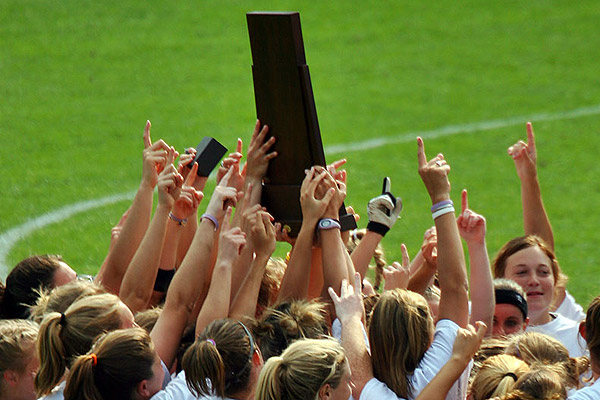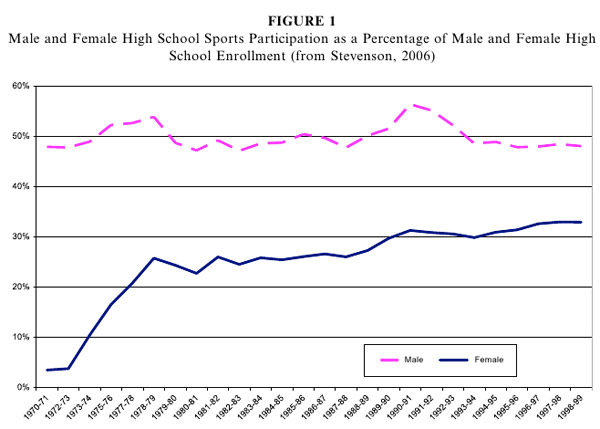
Northwestern lacrosse players celebrating their 2005 NCAA championship, the first Northwestern won in any sport since 1941
There's not a lot to be said about Sun-Times sportswriter Joe Cowley's unfortunate escapade on Twitter that hasn't already been mentioned, or that wasn't immediately clear from it; it's been archived for immortality at Deadspin, if you'd like to make your day slightly more unpleasant. The otherwise relevant details are provided by Robert Feder, who reports that Cowley is on double-secret probation. One of his commenters had something interesting to say:
I've been reading and following Cowley on Twitter for years and he has become more edgy since he became a columnist. What this incident is about is journalistic ethics on social media. From what I know and read about Cowley's Twitter is that he rights it as a persona, it's him, but not really…. Cowley uses his Twitter to rile up people. He takes pride in those who talk back to him and unfolllow him. Example his "I Hate CST_Cowley" t-shirt contests.
This tracks with what a Chicago Now blogger observed from his Twitter feed:
Cowley is a family man, he's married with two kids, (with one on the way) and as many may already know, he admirably fought and beat cancer, not once, but twice.
Cowley claimed his tweets were "satire." If anything, this would be even more depressing; as someone who reads reams of sports journalism, I've long grown tired of the weary aggro schtick that infects sportswriters gunning for a slot on Around the Horn, like the exhausting Jay Mariotti. It's like what the One Ring does to Gollum, but instead of invisibility it grants overexposure.
He took a lot of heat for comments like telling a female sports-journalism peer that she looks like "the Russian icy villain from a 70s Bond movie." But this, oddly enough, made me more upset:

It so happens that this week is the 40th anniversary of Title IX. In the beleaguered and depressing world of college athletics, it's been one of the few genuine triumphs on the legal and administrative side. Here's Sports Illustrated's Ann Killion:
Though I had spent a career covering sports, including the most dominant female athletes of our times, it was this scene on my own high school field where the full impact of Title IX hit me. On the same field where I once was a lousy cheerleader, because I realized I'd rather be writing about the players than shaking pom-poms for them, on the same field where my husband played football and my son played lacrosse, the soccer girls were conquering heroes.
[snip]
Thanks to Title IX the world became a place where my daughter never once doubted her ability to compete in sports, and where I could write about sports for a living; a place where my son didn't think twice about celebrating for his female classmates, any more than I had questioned cheering (ineptly) for my male friends.
And Graham Hayes on the legendary Pat Summitt, widely admired among the men in my family not just for her success, but also for her grit and bravery:
There is history enough in women's sports to fill a library. And there is space on those shelves for decades of history that predates Summitt or Title IX, stories of legends like Babe Didrikson Zaharias or generations of less heralded women like Maybelle Blair, who got on a train as a teenager in California and traveled to Chicago to play in the All-American Girls Professional Baseball League in the 1940s. Women's sports weren't born of Title IX, a good thing lest Summitt herself never had picked up a basketball growing up in those earlier years.
But one era of history ended and another began when it became law, at just about the same time a young woman fresh out of college started coaching the basketball team at the University of Tennessee.
Or Robert Kaestner of UIC and the NBER, along with UIC's Xin Xu, who researched the "Effects of Title IX and Sports Participation on Girls' Physical Activity and Weight":
We found that increases in girls’ participation in high school sports, a proxy for expanded athletic opportunities for adolescent females, were associated with an increase in physical activity and an improvement in weight and body mass among girls. In contrast, adolescent boys experienced a decline in physical activity and an increase in weight and body mass during the period when girls’ athletic opportunities were expanding. Taken together, these results strongly suggest that Title IX and the increase in athletic opportunities among adolescent females it engendered had a beneficial effect on the health of adolescent girls.
Most of the attention devoted to Title IX has focused on college athletics, because of its prominence and economic impact, but it's had a vast effect on participation in high school athletics:

Perhaps Cowley really does think Title IX is a joke; it'd be modestly more encouraging than just using it to needle someone over her gender. Title IX isn't not without its problems in implementation, as an expose last year in the New York Times found, so the program has developed some critics over the years.
But as women have grown to 57 percent of American colleges’ enrollment, athletic programs have increasingly struggled to field a proportional number of female athletes. And instead of pouring money into new women’s teams or trimming the rosters of prized football teams, many colleges are turning to a sleight of hand known as roster management. According to a review of public records from more than 20 colleges and universities by The New York Times, and an analysis of federal participation statistics from all 345 institutions in N.C.A.A. Division I — the highest level of college sports — many are padding women’s team rosters with underqualified, even unwitting, athletes. They are counting male practice players as women. And they are trimming the rosters of men’s teams.
This has led libertarian NYU/U. of C. law prof Richard Epstein, among others, to call for Title IX's repeal. It seems like an extreme reaction to subterfuge that's comparatively minor in the context of Title IX history (especially given that Title IX is not limited to college athletics), but at least he gives it the dignity of a hearing. It's an awful lot of history to be dismissed blithely as a "joke" in the service of a self-defeating persona, particularly by a sportswriter. The whole thing's just depressing, but don't just take it from me, take it from the late @CST_crowley persona:

Photograph: dcJohn (CC by 2.0)



